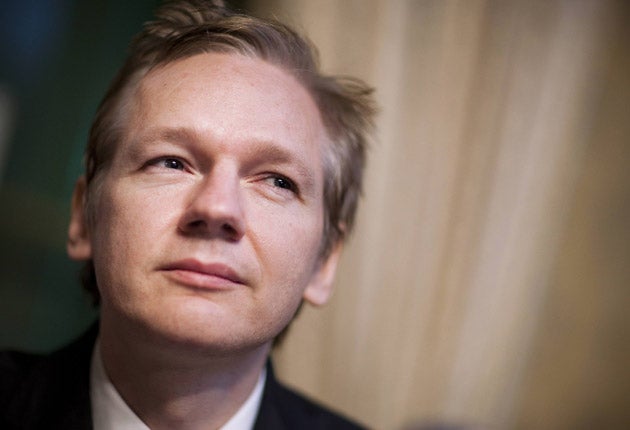A WikiLeaks job interview: Julian will see you now...
WikiLeaks might be the world's biggest threat to government secrecy, but its HR department needs some work. Aled John goes for a job interview with Mr Assange

What would you do if you had to kill one man to save a hundred?" Long pause. "That's an impossible question to answer," I say.
"You've got two minutes to think about it before they all die," he says.
I am near the end of a somewhat unconventional job interview.
WikiLeaks is the organisation. My interviewer is Julian Assange.
It's hard not to feel self-consciously Tinker Tailor... about the whole affair. As I head to an imposing west London address, I wonder what I am walking into.
"You have no connection to either group of people."
I think I know the answer Assange wants. This is the climax of his questioning, covering my family background, parents' upbringing, religious beliefs, economic and social philosophy.
After about 30 seconds of silence, I muster a response.
"Well, if I could rationalise that the greater good would be achieved by saving more lives, then... I guess the man would have to go," I say, lying; unconvincing to myself, but maybe less so to my audience.
How strange to utter the death sentence of an unknown innocent for the "greater good" of the many, to impress in a job interview. This reductionist, moral utilitarianism seems ethically unjustifiable, but what do I know?
I wonder if I'm glimpsing the fringes of Assange's philosophy and it's unsettling. The idea is dangerous.
I look at him, perplexed. The claustrophobia of his house arrest and the siege mentality provoking this philosophy are reflected in his constant talk of being "at war" and echoed by the Stockholm Syndrome-lite relationship between him and his disciples. What risks are we to take for Assange's goal of ultimate transparency?
"Good answer," he says.
A few months ago I was forwarded an email, titled "Recruiting for WikiLeaks". I've worked as a junior journalist for a prominent news organisation for the last year, as WikiLeaks' impact has burned across the world. They were involved in big, interesting movements – cultural shifts, imperious challenging of authority for the notion of complete transparency. It was the sort of work I probably thought I wanted to be involved in: "Successful candidates will be disciplined, articulate, quick-witted, capable of multi-tasking and accustomed to lack of sleep. Ability to start immediately is essential."
This notice, to join the "press office of WikiLeaks London", was vague.
Not so sure how my CV would reflect how little sleep I get, however. It seemed strange they would interview a recent graduate with no PR experience for a role in an organisation that consistently gets attacked from big hitters, such as the US State Department.
Sitting there with Assange, it strikes me how small and disorganised the operation seems. Fewer than 10 people work there full-time and my role would consist largely of trawling through media reports about WikiLeaks and Assange. Do I want to spend my day monitoring public sentiment for and against this former hacker? Not really.
I suggest that Assange's profile and ego, compounded by his notorious court case, have overshadowed the work they do. He spoke of a desire to become recognised as a viable media publishing brand, bitterness that, not since the initial releases, have the British press taken on its stories for front page splashes and anger at its portrayal by the BBC. I suggest that people would be less suspicious if WikiLeaks revealed its workings and exemplified the transparency for which it calls. This was not an idea to which they warmed.
For all the initial excitement, I leave bewildered and deflated. Realising the vanity that had driven me to think of becoming involved in WikiLeaks, I resolve not to pursue it.
Join our commenting forum
Join thought-provoking conversations, follow other Independent readers and see their replies
Comments
Bookmark popover
Removed from bookmarks